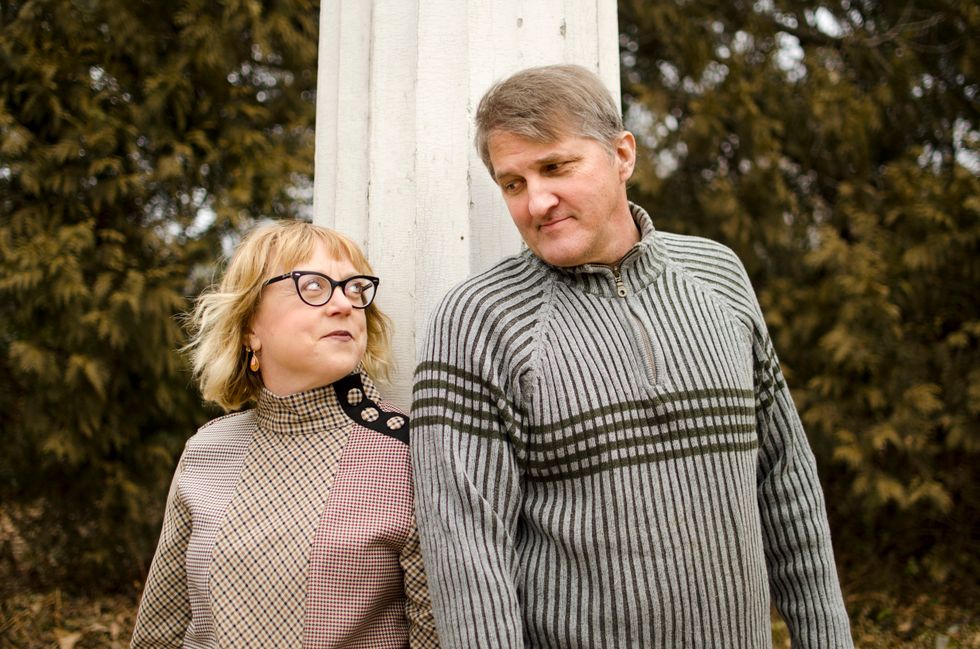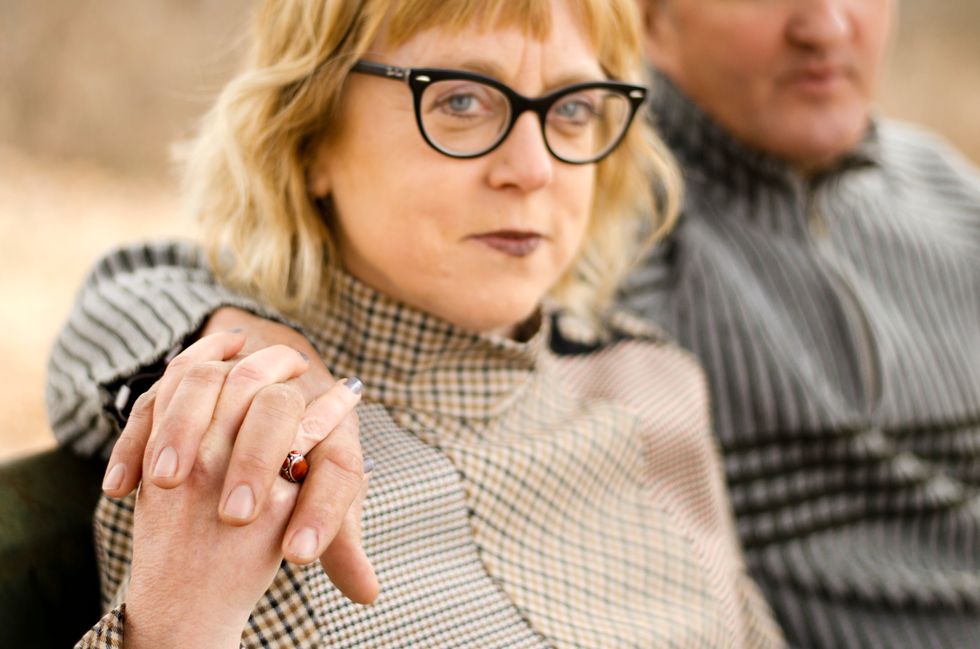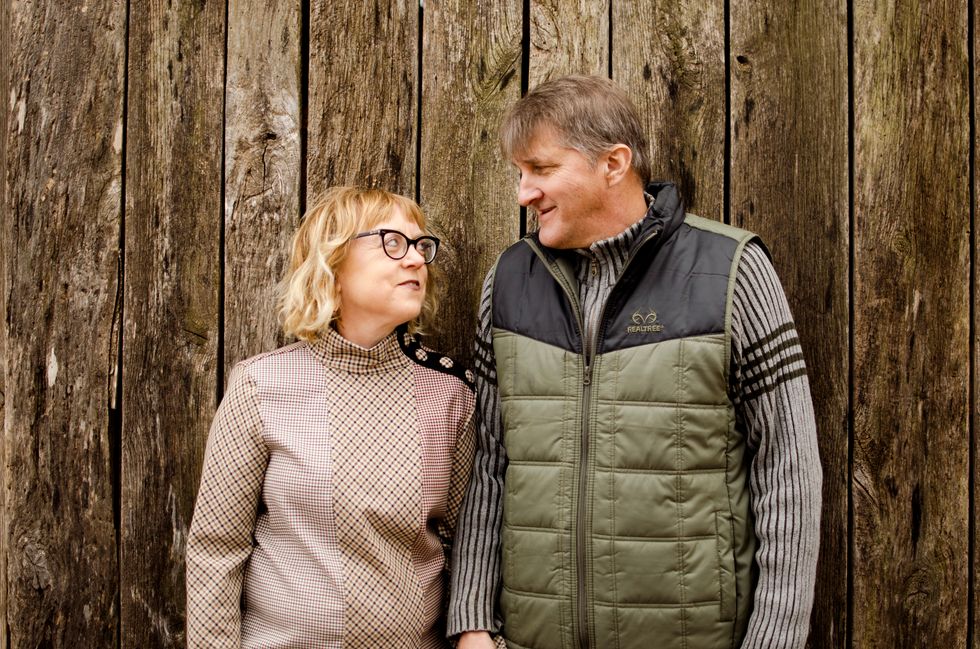There is a beautiful old brick home in Amherst, Virginia partially hidden behind an equally old brick wall. At first, everything on the property is quiet and for a moment I simply want to stand and breathe in the cool January air. Peace seems to live here, soaking into our bones as we walk up the front porch steps, and then the tranquility is shattered with laughter and excitable dogs and the companion of peace: joy.
Joy stays with the four of us, Roy and Karen Prior, myself, and our photographer AnnaClaire, throughout the two hours of pictures and questions. Dr. Karen Swallow Prior is an English professor at Liberty University and a published author twice over and her husband Roy Prior is a high school vocational skills teacher. They are two of the kindest, wisest, and funniest people we have ever had the honor of interviewing. It seems we can hardly go ten minutes without some type of joke that leads to an eruption of bone deep laughter. The interview hardly seems like a business venture anymore. Instead, we are laughing and learning and listening until we climb back into our car and drive back to our university’s campus, peace and joy clinging to our bones.
What is your favorite memory of each other?
R- I mean, when you marry your dream girl it’s hard to pick just one. Walking our dog in the cemetery when we lived in New York is just one example. It was a peaceful time together with nothing else going on. We just got to talk to each other and play with the dog. The stress of life was just gone.
K- The backstory for one of my favorite memories is that we got married and lived in Buffalo, New York for a number of years. We’d both always wanted to live in Virginia or Maryland. Moving here was our dream and it took us a long time, but when I got the job at Liberty, Roy came down here to look for apartments. While he was down here we learned that we might be able to buy a house, so he was looking at houses alone and telling me about them. Ever since I was a little girl, I’d always wanted a brick farm house in the country. When he got home, he had a picture of the house, this old brick farmhouse in the country where we live now, and a card and he gave it to me. I still have that picture.
I know you two got married pretty young. Looking back, would you still have gotten married as young as you did?
K- I would. I’m very set in my ways and I like things a certain way. I get more inflexible the older I get, so I think being able to grow and adapt to each other while we were so young worked out. Blending our lives at the early stages when were both growing as people and growing as Christians and being discipled by a good pastor and a good church was really good. It would’ve been a lot harder to do that when we got older.
R- The night I asked Karen’s dad if I could marry her, Karen asked her mother, “What do you think of my pick?” Her mother said, “I don’t think it was your pick,” meaning that it was providential- it was God’s pick. That’s how I feel about us getting together and when we got together. It wasn’t a matter of our timing, it was God’s.
What has been the biggest struggle in your marriage and how have you overcome it?
R- Neither one of us wants control of the check book. [They both laugh.]
K- I would recommend to people who are dating to try to be in a couple where one of you is good at handling money.
R- There are things personality-wise that are sometimes a struggle that you just have to learn how to deal with.
K- Something we all struggle with is having certain expectations, especially with gender roles, like who’s supposed to cook and who’s supposed to take out the garbage or even what the other person is supposed to be like. Just getting over that and realizing that the other person doesn’t have to do that or be this certain way and that the only problem is that you think something is supposed to be that way is very freeing.
R- One of the worst mistakes one can make is thinking, even a little bit, that someone is going to change. That’s a false expectation and it’s a burden you’re putting on someone. Our most formative years are with our parents, so that’s where most change happens, although changes can happen later in life.
K- A close friend of ours who has been married for about as long as we have said once that the thing she admires about our marriage and example is that we accept each other for who we are. There were some struggles over small things (for me, it was going to bed earlier), but we really just love each other for who we are.
R- You’re not going to live with someone for thirty-three years without having some arguments. That’s a fantasy. Another thing we’ve always said is that if you know divorce isn’t an option, you’re going to work it out. Otherwise, you’ll be miserable your whole life. So if you know that’s not an option since you took your marriage vows, rule that out. Our society says that you don’t really have to, but that’s not the case at all. You stood before God and you made a vow. When divorce isn’t an option, you work things out.
Has not having children affected your marriage? If yes, how so?
K- Well, it’d be very different if we had children, but it’s hard to compare since we don’t know what that would have been like. Comparing ourselves to our friends and peers who have children [being childless] just allowed us to be freer to let each other be ourselves and do the other things God has called us to. There are so many things I’m getting to do now that I know I never would have gotten to do if I had children. I believe those are things God has called me to.
R- I don’t think you can compare the two. You could also ask if a relationship would be changed by having children and of course the answer would be yes. So it’d be different. I think the more important thing to ask is, what is our role in God’s plan? What should we be doing with the situation that we’ve been given? If we had been given children, things would definitely be different because of the children’s presence and we would have gone that way.
Do you have any advice for people who have struggled to have kids?
R- Well, personal viewpoints, I guess. We decided at one point that it actually was in God’s hands, that if we were going to say that then we needed to mean it. We weren’t going to introduce anything else, not that we’re condemning people using artificial reproductive technologies or anything. We just felt that if God’s in control, then He’s really in control and accepted that.
K- We were realizing we were infertile around the same time we were very active in the pro-life movement. To us, it was the same idea in reverse. If we were asking people to accept the life that God had given them even if it wasn’t something they wanted or sought out, then for us to not accept what He had not given us seemed like the same principle.
R- Also, Karen teaches at the university and I teach at a high school and I have about all of the kids I want. I enjoy working with kids and I know Karen really loves teaching, so it’s not quite the same, but the best part of it is that we don’t have the food bill.
K- If God had wanted us to have children He could have and it wouldn’t have been a miracle or anything, since we did seek the medical field to correct things and that still didn’t work. So the advice, really, is to not look at what He hasn’t given you, but look at what He has given you. He’s called us all to something and He’s given us all opportunities. It goes back to expectations and not expecting a person to be who you want them to be or the way you want them to be. It’s the same thing with our lives. God has given us a life and it might not be the one we expected or imagined, but it’s still the one He gave us, so let’s just go with it.
You got married in college. So do you have any advice for people who might want to get married as young as you did?
K- I’m watching a lot of famous Christians of different ages, mostly younger than us, that are idealistic and who seem to be faithful that are getting divorced. I just sometimes wonder, what’s going wrong? I think some of it goes back to expectations.
I love marriage and I can’t imagine not being married. I don’t think we’ve found it as hard as some people say it is, although my mom says that’s because we didn’t have kids. And actually, probably some of our biggest arguments in the beginning were about the dogs, so I can see that. But so many people go into marriage thinking this person is supposed to be their everything and marriage is supposed to be everything.
It’s a good and wonderful thing, but life goes on. You still have to be a faithful Christian, you still have to be a faithful son or daughter, a faithful friend, a faithful church attender. You have to be all these things in your life and marriage is the best of all those things, but it’s still not everything. It’s more of the foundation, but young people are expecting it be something that it’s not and then when it’s not, it must be all wrong. It must not be meant to be. No, it was meant to be. Keep going!
R- I think also that culture changes. It’s a different world now. When I talk to my students, I tell them that it’s a ‘me’ world now. Maybe it was then too. But marriage is not about ‘me’ at all. If someone was going to get married and I had to give them a piece of advice, I’d tell them to ask themselves this question: can I live the rest of my life for someone else? If you really think about it and remember that divorce isn’t an option, that you’ll be “stuck”, that’s a pretty huge commitment. Inherently, we’re selfish. Everyone is. We’re about ourselves. But are you willing to put all of that aside and live for someone else?
K- I love how that’s worded, for someone else. Really, literally for someone else. Because if you say for Susie or for Timmy, whoever that person is in your mind is going to be different as you get to know them. It can’t be that you’d die for that person because that person you have in your mind is not who that someone actually is. But just the idea of living for someone else who turns out to be someone you don’t know as well as you thought you did or who changes because we all grow and change is what marriage has to be about.
If you could tell one thing to the newlywed version of you, what would you tell yourself?
K- It seems like so much of the disappointment and anger is about unreasonable expectations. I’ll give a really silly example. Roy does not have a very good memory, especially related to the routine and structure that I like. So to me, it’s Wednesday and it’s garbage day and I have two expectations. Number one, that the man should take out the garbage and number two, that you should always remember that it’s Wednesday and it’s garbage day. But he doesn’t wake up and immediately think that it’s Wednesday and this is what I have to do today like I do. So for years and years, I would be upset and take it personally if he forgot to take the garbage out. Then, all of a sudden, one day I realized that he’s just not the type of person that remembers that it’s garbage day. Why don’t I just take the garbage out myself? We were married for fifteen years before I realized that I could just take the garbage out myself. That was the stupidest expectation that I had.
And now that my parents live with us, my father takes the garbage out, because he’s even more structured than I am. It’s a small example, but I got so upset and I saw it as a failure or something. It was a failure of my fantasy expectation which has no logical reason for existing. So, there are a lot of conflicts that really are just constructs of our imagination, although I know there are some real ones.
R- I think I would tell myself to relax. You’ve got this. And another thing is, build a garage. [Both of them laugh.] I tell all of my students that the first thing you do after you get married is build yourself a garage. It can be metaphorical- it means that everyone needs a place for a little solitude where you can think things out if you need to.
We tend to over-romanticize the early stages of marriage, like growing together. So in what way are you two still dreaming together in this season of your life now?
K- Well, I feel like we’ve worked really hard to get this life. This is the life we’ve both always wanted- living in the country, having dogs, just being settled. I feel like we’ve achieved our dream and it’s everything we wanted it to be. Now we’re just enjoying it.
R- We’re living the dream.
K- Yeah! But it’s a simple dream. And God keeps doing more and opening more opportunities that I never would have imagined, like with my writing. My life verse is Proverbs 16:9, which is “the mind of man plans his ways, but the Lord directs his steps.” We’ve done a lot of planning and dreaming and what we’ve planned has come true with the Lord’s help, but now it seems more like we’re seeing where the Lord takes us, such as ministering to students, and bringing my parents here to live with us.
What do you like most about each other?
K- Roy is the most ethical person I know. I think we live in a world where it’s harder and harder to find people with integrity, and he has the most integrity of anyone I know.
R- One of the things I admire most about her is her intolerance for injustice.
K- Remember when I was working at Howard Johnson’s and the homeless people came in and I called you to come take them down to the shelter?
R- Yes! I asked who they were and she said she didn’t know. But that’s happened over and over, her reacting to all types of injustice. I can’t tell you how many times it’s been animals. That’s something else I admire about her, her love for animals. It doesn’t necessarily have to be a person, it can be a chicken or a dog or a cat or anything.
In Booked, your memoir, you mentioned that you married a man strong enough to be yourself. Can you go into more detail on that?
K- He’s let me pursue everything from an education to a career to travelling for my writing and there’s never been an issue. He’s never interpreted anything as affecting our relationship negatively. It seems like a normal, decent human thing to do, but because of societal expectations, I’ve seen a lot of men who wouldn’t be comfortable with women doing these sorts of things.
While I was packing up to leave, Dr. Prior thought of another piece of advice she wanted to share about marriage:
K- I normally get asked by girls, but I guess this can go both ways. Marry someone you respect, not just someone who makes you feel good about yourself. The things you need to feel good about will change over time and the person might not always make you feel that way. So it should be someone you respect for who they are, not for how they make you feel.
The Priors’ incredible honesty and openness in, not only their answers,
but in welcoming us into their home was astounding. Their advice concerning
expectations is applicable to all relationships, not just marriage, and their
affirmations that God’s call on our lives can be different than expected, but
still joyfully followed is life advice that everyone needs. That is all we
really need to know to live our own dreams.






















